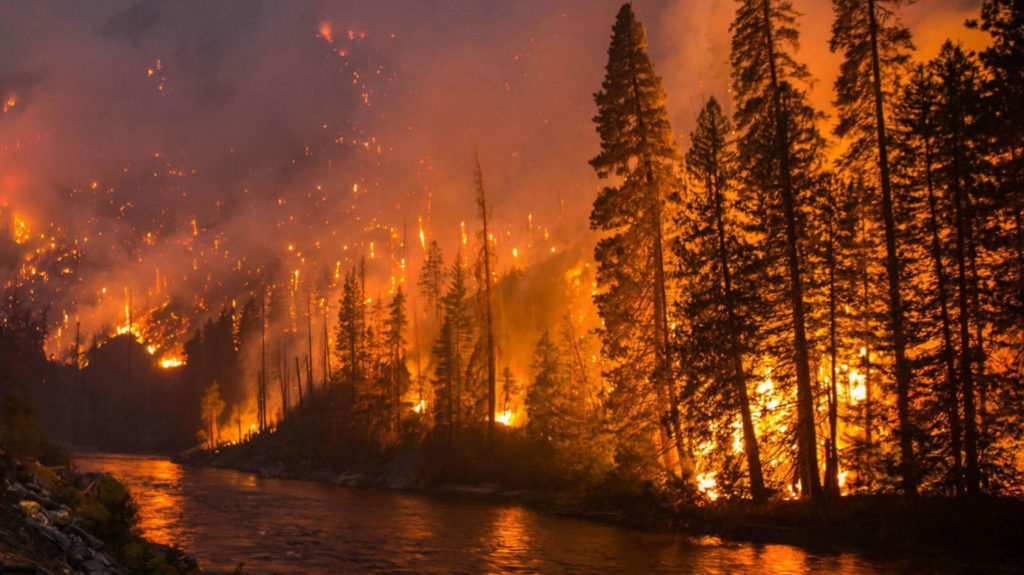Tree Planting After Forest Fires, Wildfires, and Natural Deforestation
Forests are the lungs of our planet, providing clean air, regulating water cycles, and serving as havens for wildlife. They inspire awe and provide a vital balance. But this delicate harmony is often disrupted by devastating wildfires and deforestation events that leave scars not only on the trees and the land but on ecosystems and communities. As these forces of nature shape our landscapes, the damage poses significant challenges—and opportunities for renewal. That’s why The Trees Remember partners with organizations to plant native trees in areas affected by fires and natural deforestation. With approximately 30 active programs across North America, we’re dedicated to restoring forest ecosystems for future generations.
Understanding Forest Fires and Wildfires
Forest fires and wildfires refer to uncontrolled fires that spread rapidly across woodland areas. While some are caused by natural phenomena like lightning strikes, human activities such as unattended campfires, discarded cigarettes, and arson account for a staggering 85% of wildfires in the U.S. According to the U.S. Forest Service, these fires burned more than 7.5 million acres in 2022 alone.
While wildfires can be catastrophic, they also play a natural role in ecosystems. Fires clear out dense undergrowth, create nutrient-rich soil, and even help some species, like lodgepole pines, to release seeds. However, the increased frequency and scale of wildfires in recent years have tipped this balance, turning beneficial cycles into widespread destruction. Fire is both a destroyer and a creator in nature. Destructive flames can wipe out ecosystems in moments, yet its regenerative heat sparks life by enriching soil and fostering growth for fire-adapted tree species.
Ecological Effects of Wildfires
Wildfires leave a profound impact on the environment, particularly on forests, which play a crucial role in maintaining ecological stability. The immediate and long-term effects of these fires extend across habitats, waterways, and the climate.
- Habitat Destruction: Wildfires destroy the homes of countless species, including endangered animals. The loss of mature trees and understory vegetation disrupts ecosystems that rely on forested areas for survival.
- Waterway Degradation: Forests act as natural water filters, and when trees are lost to fire, sediment and ash pollute waterways. This degradation harms aquatic ecosystems and affects species reliant on clean water sources. Over time, these changes can devastate local ecosystems and reduce the availability of clean water for human use.
- Carbon Emissions and Climate Change: Wildfires release vast amounts of carbon dioxide, contributing significantly to global warming. The destruction of trees exacerbates the issue by reducing the planet’s capacity to sequester carbon.
Habitat destruction forces species to migrate or perish, further destabilizing ecosystems. The loss of tree cover along rivers and streams results in increased erosion and sedimentation. This not only lowers water quality but also alters the flow and temperature of waterways, making them inhospitable for aquatic species. Fish, amphibians, and other wildlife that depend on stable aquatic habitats are often left vulnerable. Endangered animals like the red-cockaded woodpecker, native to Southern pine forests, face threats to their already fragile habitats. Additionally, plant species unique to certain regions often cannot regenerate without human intervention, leading to a loss of biodiversity and ecological balance.
According to the USDA, emissions from U.S. wildfires in a single year can rival those from the entire transportation sector. The loss of forest trees diminishes one of the Earth’s most effective tools for capturing and storing carbon, creating a feedback loop that intensifies global warming. By addressing these effects with tree planting projects, we can mitigate the damage caused by wildfires and support the recovery of forest ecosystems.
Causes of Natural Deforestation
Beyond wildfires, natural deforestation arises from insect infestations, severe storms, and prolonged droughts. Bark beetle outbreaks in the Rocky Mountains, for instance, have decimated millions of acres of trees. These events often weaken forests, making them more susceptible to further damage.
The effects of deforestation ripple across ecosystems. Fragmented forests force animals to migrate, disrupt food chains, and leave soils vulnerable to erosion. Without reforestation, these areas face a decline in biodiversity and ecological health.
Restoring Hope Through Tree Planting
Reforestation offers a powerful solution to combat the ecological fallout of wildfires and deforestation. Planting native tree species restores habitats, stabilizes soil, improves water quality, and even helps combat climate change by absorbing carbon dioxide. For example, longleaf pine restoration in the Southeastern U.S. has helped revive habitats for nearly 600 plant and animal species.
Our tree planting locations vary from year to year based on recent events such as new wildfires or other natural disasters. By focusing efforts on areas that need it most, The Trees Remember ensures that each tree planted makes a difference. Projects span from the pine forests of Texas to the rugged landscapes of Canada, in regions where reforestation will have the greatest ecological impact. We partner with local workforces and professional organizations and when these partners provide data, we’re proud to share and maintain information on past successes and continued impact.
Explore our history and previous planting programs to learn more.
Take Action Now, Help Restore Our National Forests
Every tree planted is a step toward healing the planet. By supporting reforestation programs, you’re not only restoring forests but also ensuring clean air, water, and thriving habitats for generations to come. Whether as a meaningful gift or a personal memorial, your involvement makes a difference. By choosing to plant a tree, individuals and organizations can directly contribute to our vital restoration projects.

